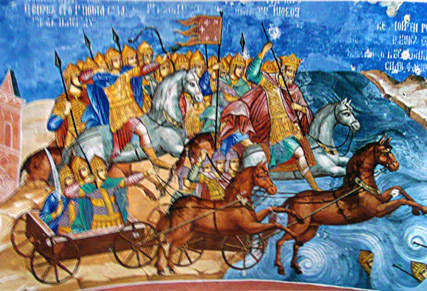Q. When God parted the Red Sea for the Israelites to cross, and when God then made the waters sweep back over the pursuing Egyptians, did Pharaoh drown with his army?
This question is much debated by biblical scholars. Many say yes, while others say no. I can only give you my own opinion on the matter, which is that Pharaoh did not drown with his army.
The book of Exodus does say that “when the king of Egypt was told that the people had fled . . . he had his chariot made ready and took his army with him” to pursue the Israelites. So it seems that Pharaoh did personally accompany the army out into the desert.
However, the further details in the account suggest that he didn’t join the actual pursuit of the Israelites. Rather, Exodus says that “all Pharaoh’s horses and chariots and horsemen followed them into the sea.” It describes God telling Moses, “Stretch out your hand over the sea so that the waters may flow back over the Egyptians and their chariots and horsemen.” And the book then says that “the water flowed back and covered the chariots and horsemen—the entire army of Pharaoh that had followed the Israelites into the sea.”
Pharaoh himself was apparently not included in this group (“the entire army of Pharaoh”), because when Moses and the Israelites compose and sing a song afterwards to celebrate the event, they say:
Pharaoh’s chariots and his army
he has hurled into the sea.
The best of Pharaoh’s officers
are drowned in the Red Sea.
It seems to me that if Pharaoh, the ruler of all Egypt, had also been killed, the song would have mentioned this as the high point of the victory and not spoken only of his “best officers.”
I think that in this light, we should understand the statement in Psalm 136 that God “swept Pharaoh and his army into the Red Sea” to mean that God swept Pharaoh, personified in his army, into the sea. This would be in keeping with the view in the ancient world that the “host” of a ruler (that is, his army or troops) was an extension of the ruler himself. (In Daniel’s vision of the Ancient of Days, God is depicted that way, surrounded by the heavenly host emanating from his throne: “A river of fire was flowing, coming out from before him. Thousands upon thousands attended him; ten thousand times ten thousand stood before him.”)
As I said, others might answer the question differently, but this is what the biblical account suggests to me.


I think I am personally gratified with this response. Because according to what is written in Exodus, Pharaoh himself did not take part in the pursuit of the isrealites.
It was often very rare for a King to follow and lead his army he often stayed back
I need you to explain this verse and what it means. Psalms 136:14 and 15. And made Israel to pass through the midst of it: for his mercy endureth forever: But overthrew Pharaoh and his host in the Red sea: for his mercy endureth forever.
Within the post itself, I explain, “We should understand the statement in Psalm 136 that God ‘swept Pharaoh and his army into the Red Sea’ to mean that God swept Pharaoh, personified in his army, into the sea. This would be in keeping with the view in the ancient world that the ‘host’ of a ruler (that is, his army or troops) was an extension of the ruler himself.”
Overthrew in Psalm 136:15. Exodus 15:19. Exodus 14:13.
God never or was not affected of killing Pharaoh and His army’s , is their own negligence and out of evil associates.
Man reap what he sow, GOD IS NOT A KILLER.
HIS GOD OF YESTERDAY,TODAY AND FOREVER BE GOD, HE CHANGES NOT
IT WASN’T AND NEVER BE GODS PLANE TO KILL ANYONE, IT WAS THEIR OWN EVIL MANIPULATIONS LEAD THEM TO DEATH .
COMMENT…., THIS IS WHY WE ARE SUPPOSED TO BE GOOD , KIND ,LOVE, AMONG MEN. THANK YOU